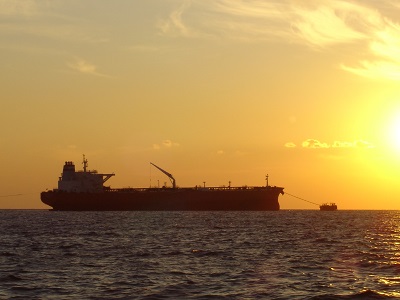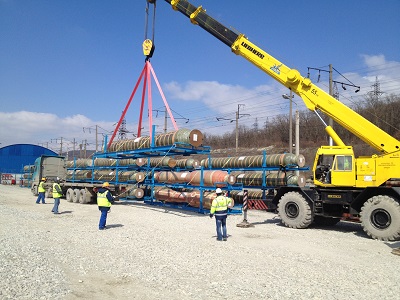[Exclusive] Russian Ports Pose Challenges for Oil Companies
There are several challenges to operating offshore Russia, beyond just the weather, says Arkady Podkopaev, GAC Russia general manager. The limited capacity of the existing Russian ports is a major operational challenge for oil companies who need dedicated berths and storage areas within ports for supply base operations. “As a rule, the Russian ports are not prepared to rent out any of their facilities on a long term basis,” he says.
“Even if the port does agree to dedicate some of their berthing and storage facilities for a supply base, they are unlikely to allow the supply base provider to bring and use their own manpower and mobile hoisting equipment inside the port and will insist that the port’s resources be used instead. This brings up the need to have the port personnel trained and have the equipment well maintained to meet demanding operational and safety requirements,” says Podkopaev.
 The areas adjacent to the berths need to be dredged to achieve project depths and port cranes have a reduced hoisting capacity and often break. In some of the ports there is also a shortage of stevedores, and sometimes vessels have to wait for a few days before the port sends a gang for unloading.
The areas adjacent to the berths need to be dredged to achieve project depths and port cranes have a reduced hoisting capacity and often break. In some of the ports there is also a shortage of stevedores, and sometimes vessels have to wait for a few days before the port sends a gang for unloading.
Not every port is licensed to handle hazardous cargoes like explosives and equipment with radioactive sources which are used for drilling operations. This can create logistical challenges. The roads leading to the ports are sometimes in poor shape and can become congested with trucks which lead to further operational delays.
“Having relevant experience and operationally informed knowledge of the infrastructure is critical to being able to operate successfully and efficiently in Russia. For one project GAC may offer to use a few different berths in one, two or more ports which will make up for each of the port limitations and combining their capacities to arrange handling of the whole scope of offshore cargoes as soon as it is required by the operations.
“For example, one port may be used to ship out drilling mud and dry bulk for drilling operation, and the other port will be used to receive drill cuttings generated by drilling. As the storage space in the ports is limited, we usually try to source alternative open and closed storage areas located outside but in the vicinity of the ports. All the work requires extremely good planning and has to be coordinated closely with all the relevant authorities including the harbor master’s office, customs, and immigration control.”
Offshore support services are going to be in high demand later this year given Exxon Mobil’s new drilling activity in the Black Sea and Kara Sea, and the building of South Stream pipeline, says Podkopaev. In the past, the number of offshore projects was quite limited, and there were few, if any, shipping and logistics companies able to deliver the integrated support services. “GAC, having vast experience in overseas offshore projects, good knowledge of the Russian infrastructure and established relationship with the ports of Novorossiysk, Taman, Temryuk, Murmansk, Kandalaksha and Astrakhan, is in a good position to fill this niche.”
GAC Russia has signed a Memorandum of Understanding with a number of Russian ports for provision of supply bases. For example, in the port of Kandalaksha on the White Sea coast, the company offers 100 meters of berth with the depth of 7 meters, 15,000 square meters of open storage area and 2,000 square meters of closed warehouse to offshore operators and subcontractors. This port is equipped to handle hazardous cargoes.

that matters most
Get the latest maritime news delivered to your inbox daily.
 As opposed to the nearby ports of Murmansk and Arkhangelsk, Kandalaksha is less congested with shipments of bulk cargoes and can be more suitable as a supply base to support offshore projects in the Barents and Kara Sea’s. Moreover, GAC Marine Turkmenistan has a big support fleet in the Caspian that can be mobilized to Russia, in Caspian and Azov waters as well as the Black Sea – for upcoming offshore projects. “This makes GAC the only company able to provide shipping, logistics and marine services for the offshore sector in Russia.”
As opposed to the nearby ports of Murmansk and Arkhangelsk, Kandalaksha is less congested with shipments of bulk cargoes and can be more suitable as a supply base to support offshore projects in the Barents and Kara Sea’s. Moreover, GAC Marine Turkmenistan has a big support fleet in the Caspian that can be mobilized to Russia, in Caspian and Azov waters as well as the Black Sea – for upcoming offshore projects. “This makes GAC the only company able to provide shipping, logistics and marine services for the offshore sector in Russia.”
GAC Russia started its operations in Russia in 2001 as a ship agent, but later expanded its package to multimodal transportation and freight forwarding of out-of-gauge and heavy lift cargoes. GAC branch offices are strategically located in the areas where offshore developments have been under way recently or are set to take off in the near future, including Novorossiysk and Taman on the Black Sea, Astrakhan on the Caspian Sea, and Murmansk on the Barents Sea.
